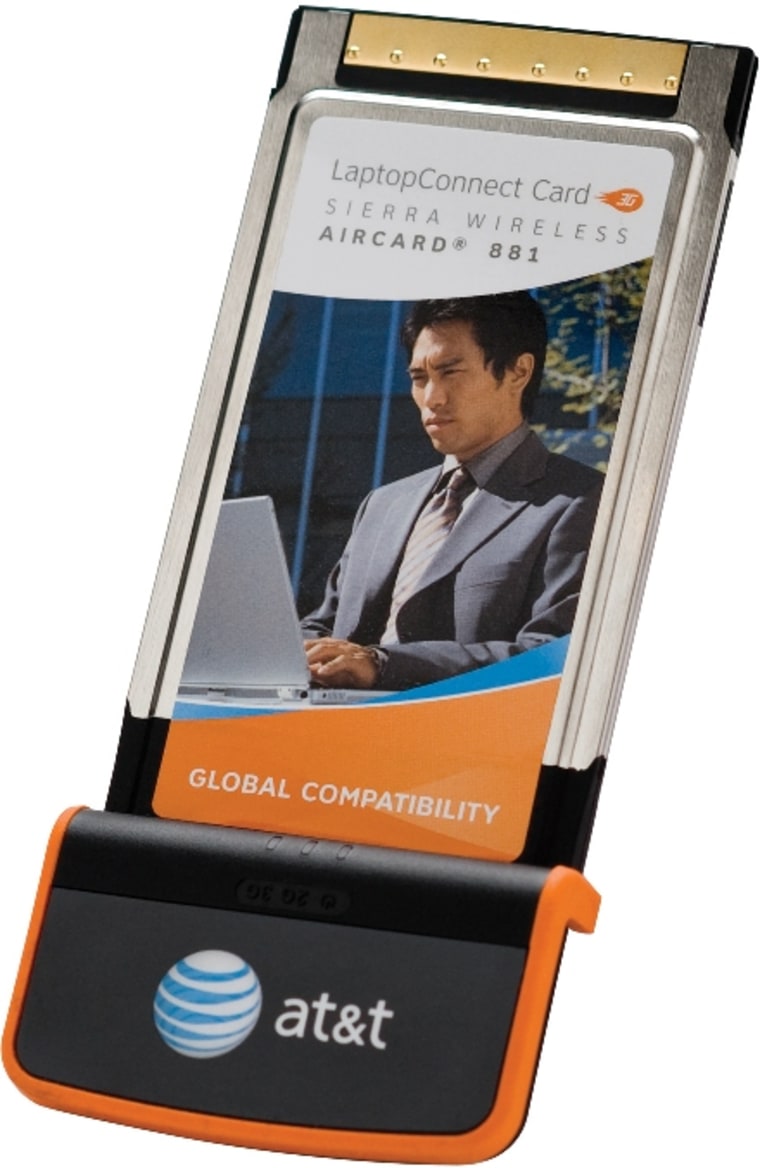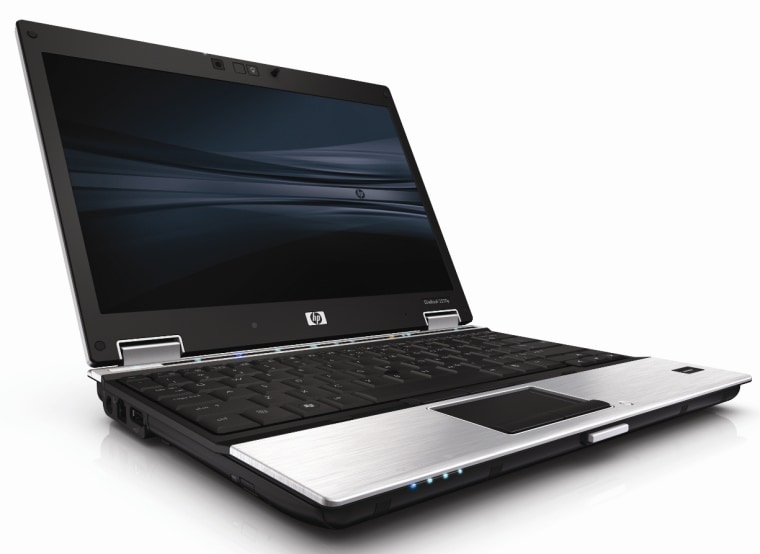Tired of having your credit card at hand and going through Wi-Fi set-ups at coffee shops, hotels and airports so that you can get Internet access on your laptop?
A lot of business travelers are, no doubt. Right now, they’re the target market for high-speed laptop cards and modems that let them connect wirelessly anywhere to Verizon Wireless, AT&T or Sprint’s 3G networks, at a cost of about $60 a month.
Having such anywhere access may be worth the price and convenience to many road warriors, considering the expense, lost time and aggravation they have go through trying to find handy Internet connections.
“If you’re comparing it to spending money at hotels for Wi-Fi service and at Starbucks and coffee shops and airports, and if you were to even spend just a week on the road paying for those services, suddenly spending $60 a month seems perfectly reasonable — a bargain, even,” said Avi Greengart, Current Analysis research director for mobile devices.
“If you’re on the road and need to have constant connectivity with a full PC, and not just with a smartphone, then the cost is almost irrelevant. This gives you the ability to continue working wherever you are.”
3G, or third-generation, wireless connection speeds vary by carrier. Verizon Wireless, for example, says its BroadbandAccess plan provides download speeds of between 600 kilobits per second and 1.4 megabits per second, with upload speeds between 500 and 800 kilobits per second. In the United States, the median download speed is 2.3 megabits per second, according to the most recent "Speed Matters Speed Test," done by the Communications Workers of America.
Sprint’s Mobile Broadband and AT&T’s LaptopConnect programs have similar speed ranges to Verizon Wireless. T-Mobile, which is just starting to launch its 3G network in the United States, does not now have a mobile broadband plan.
Keep in mind, mobile broadband is not true high-speed Internet, especially when compared to the speed of a Wi-Fi network using 802.11g wireless, for example. It has a maximum transmission rate of 54 megabits per second. However, being wirelessly connected to a "hot spot" is key to getting service, hence the appeal of anywhere-Internet access using wireless carriers' 3G networks.
Heavy promotions underway
Verizon Wireless, AT&T and Sprint are heavily promoting their mobile broadband services, with some offers of free PC cards or USB modems, or at a heavily subsidized cost, to get customers to commit to one- and two-year contracts. Plans usually start at $59.99 a month.
Sprint's Mobile Broadband Plan, for example is $59.99 a month with a two-year contract, or $79.99 a month with a one-year contract.
"Both options offer up to 5 gigabytes' of data use per month, which is about equal to sending and receiving more than 1.7 million e-mails or 10,000 photos, or downloading more than 1,200 songs each month," said Emmy Anderson of Sprint.

Mobile broadband services make wireless carriers "a lot of money, and they've already spent the money on the networks to build them out, so anything they can do to monetize that pays back their investments," said Greengart.
So far, probably less than 10 percent of the consumer market has signed up for mobile broadband services, estimates Carrie MacGillivray, IDC senior research analyst for mobile enterprise.
“For consumers, cost is a contributor to them not adopting the 3G mobile broadband option,” she said.
However, she said, Verizon Wireless is offering “session-based pricing,” where you can purchase 24-hour Internet access for $15, a good way to test the waters. The company calls it a “Day Pass,” and says no long-term commitment is required to use it.
“I expect other carriers like Sprint and AT&T to follow suit, which should encourage both business use and adoption and also start to push consumer adoption as well,” said MacGillivray.
Strong growth expected
In fact, the outlook for 3G mobile broadband is quite positive, according to IDC. In a recent report, the research firm projected that by 2012, there will be 35 million subscribers of such services in the United States.
Many of the customers will use external devices, like PC cards and USB modems. But many others will prefer an embedded option, with the 3G technology built into their notebooks.
The feature has been available in some notebooks for awhile, but it has tied laptop purchasers to specific carriers when they buy their notebooks.
For example, you can buy a Dell with 3G broadband capability, but you must choose your wireless service provider when you get the notebook configured in order to make sure it works with the carrier’s network.
A new technology from Qualcomm, Gobi — as in “go, be,” the company says — works with either of the two main 3G technologies used by Sprint, AT&T and Verizon Wireless in the United States.
Several notebooks due out
Carriers outside the United States have also certified Gobi. Among them: Canada’s Telus, France Telecom’s Orange, Spain’s Telefonica and Britain’s Vodafone, the world’s largest mobile phone network operator.
The Gobi chipset, which is just starting to show up in notebooks on the market, is embedded in the computer. No external devices are needed for a 3G connection, and antennas are located behind the notebook’s display, according to Greg Raleigh, Qualcomm’s vice president of wireless connectivity.
HP was the first to release notebooks with Gobi recently, and Panasonic and Lenovo are now shipping Gobi-enabled laptops, with Dell and Acer to follow suit soon.
“You’re going to see this in a lot of Windows and Linux products,” said Raleigh. Apple, he said, has not yet committed to Gobi.
Notebooks equipped with Gobi “allow you to buy the (3G) feature without concern for which carrier you want to activate your service with,” at the time you make the computer purchase, he said.
“It allows you the freedom of choice later on, if you have a one-year agreement with a carrier and decide you want to go with another carrier a year later, then you’re free to do that because Gobi is technology-independent; it’s agnostic for the carrier technology.
“If you find yourself overseas on business or vacation, before you could not change the carrier without changing the hardware. What this allows you to do is buy the notebook with certainty, knowing that it’s going to work with all carriers in North America and Europe.”
Raleigh said the cost of adding Gobi to a laptop is up to the manufacturer. HP, for example, says it is charging $125 for its “HP Mobile Broadband powered by Gobi” on its EliteBooks.
“A lot of people pay a little bit extra to have a bigger hard drive, or for a better display or for better battery life,” said Raleigh. “And what good is a notebook if it’s not connected?
“This allows you to be connected anywhere. The world becomes your hot spot. We think that’s a pretty darn good feature that people are going to start demanding in all their notebooks.”
Expecting connectivity everywhere
Keith LeFebvre, HP’s vice president and general manager of business notebooks, said Gobi will be added to more of the company’s laptops eventually.
“This is really critical to the way we think that people are going to do mobile computing in the future,” he said. “At some point, you’re going to expect wireless connectivity no matter where you go.”
While the quality of 3G service is “still making progress,” wireless carriers are “getting much, much better in terms of being able to get very high-speed connections all around the country,” LeFebvre said.
Carriers, too, “are getting much more aggressive in terms of what they’re charging for their data rates,” he said. “It’s much more affordable for anybody who is traveling (to use mobile broadband) and who doesn’t want to pay $19.95 a night for a wireless connection from their hotel room.”
Gartner, Inc. vice president Ken Delaney said in a report earlier this year that a technology such as Gobi makes it easier to recommend to businesses considering upgrading to new notebooks that use it.
“Our standing recommendation against embedding wireless Wide Area Network cards in notebooks…has been based on lack of global coverage, high costs and poor asset protection,” he said in the report. “However, new technologies and pricing due by the end of 2008 have the potential to eliminate the problems of embedded, wireless 3G notebook purchases,” he said.
